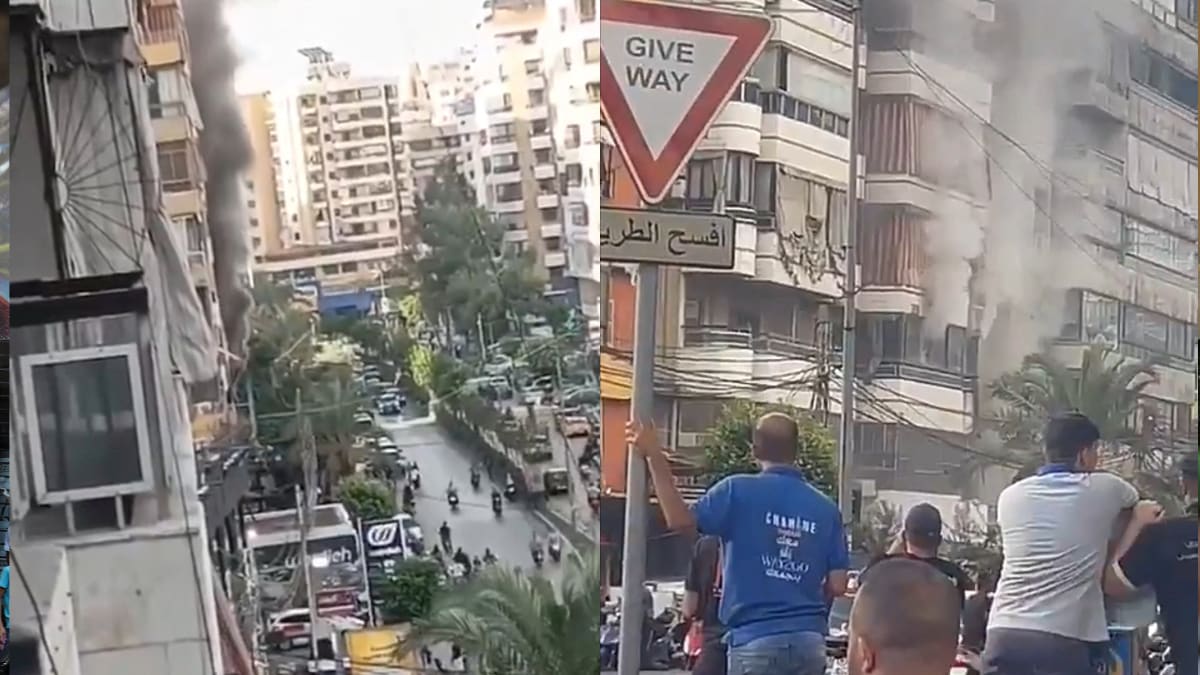Last Updated:

Smoke rises from a building after explosions as hand-held radios used by Hezbollah detonated across southern Lebanon and Beirut suburbs on September 18, 2024. (Reuters)
Israeli officials detonated Hezbollah pagers to prevent detection, leading to a deadly attack that killed 26 and injured over 3,200, escalating tensions
Israeli officials on Tuesday detonated thousands of Hezbollah pagers in Lebanon earlier than planned amid concerns that the Iranian-backed outfit had discovered their plot, according to several reports.
The decision, reportedly approved by Prime Minister Benjamin Netanyahu, was influenced by intelligence suggesting Hezbollah might have detected explosives concealed within the devices, the New York Post reported. The pagers, primarily the AR-924 model, were allegedly modified before being shipped to Lebanon from a Taiwanese manufacturer, Gold Apollo.
Explosives were implanted near the battery with a remote activation switch, allowing for a coordinated detonation. After the initial attack, a second wave of explosions occurred on Wednesday when walkie-talkie radios used by Hezbollah also detonated. This escalation was prompted by fears that Hezbollah operatives would abandon their devices after the first attack.
‘Great defeat’
According to CNN intelligence analyst Bob Baer, Israel has disrupted Hezbollah’s communications network, potentially setting the stage for an imminent military offensive in Lebanon. The recent attacks have left Hezbollah unable to coordinate its operations effectively, giving Israel a strategic advantage in the ongoing conflict, Baer, a former CIA operative, said.
Baer noted that comments from Israel’s defense minister suggest a shift in focus toward Hezbollah, with Israel “pivoting north” after concentrating efforts on Gaza. He warned that this escalation could lead to an invasion or widespread bombardment of Lebanon. He described Israel’s breach of Hezbollah’s supply and communication network as a “great defeat” for the group.
Multiple reports said that Hezbollah had switched to using pagers earlier this year due to concerns that their cell phones were vulnerable to Israeli surveillance and potential attacks. The group’s leaders had advised members to discard their smartphones in favor of these older communication devices. However, this shift proved deadly as the pagers were compromised.
‘The Last Chance’
Veteran Israeli investigative reporter Ronen Bergman told Israel’s Channel 12 that fewer Hezbollah communications devices were destroyed Wednesday compared to Tuesday. However, the larger devices targeted today were packed with more explosives, resulting in stronger blasts. “Anyone close to these devices would have had a much smaller chance of surviving,” Bergman was quoted as saying by The Times of Israel.
He explained that the targeted devices included walkie-talkies used for military communications and other components. The attacks aimed to highlight the vulnerability of Hezbollah’s entire military communications network. Bergman also suggested that those who detonated the explosives may have believed that Hezbollah would be inspecting all its supplies after yesterday’s attack. Thereby, triggering the explosions now might have been viewed as “the last chance” to do so.
‘Criminal Israeli aggression’
The Lebanese government and Hezbollah have condemned the attacks, labelling them as acts of “criminal Israeli aggression.” Hezbollah officials have vowed retaliation against Israel. Hashim Safi Al Din, a senior figure within the group, warned of “uniquely bloody revenge” for what he described as a treacherous assault on their operatives.
While Israel has not officially claimed responsibility for the attacks, US officials and various reports indicate that Mossad and Israeli military forces collaborated on this operation. Several analysts note that this incident shows an unprecedented level of infiltration into Hezbollah’s communications network. The rising tensions between Israel and Hezbollah have raised concerns about further escalations in violence in the West Asia region.

